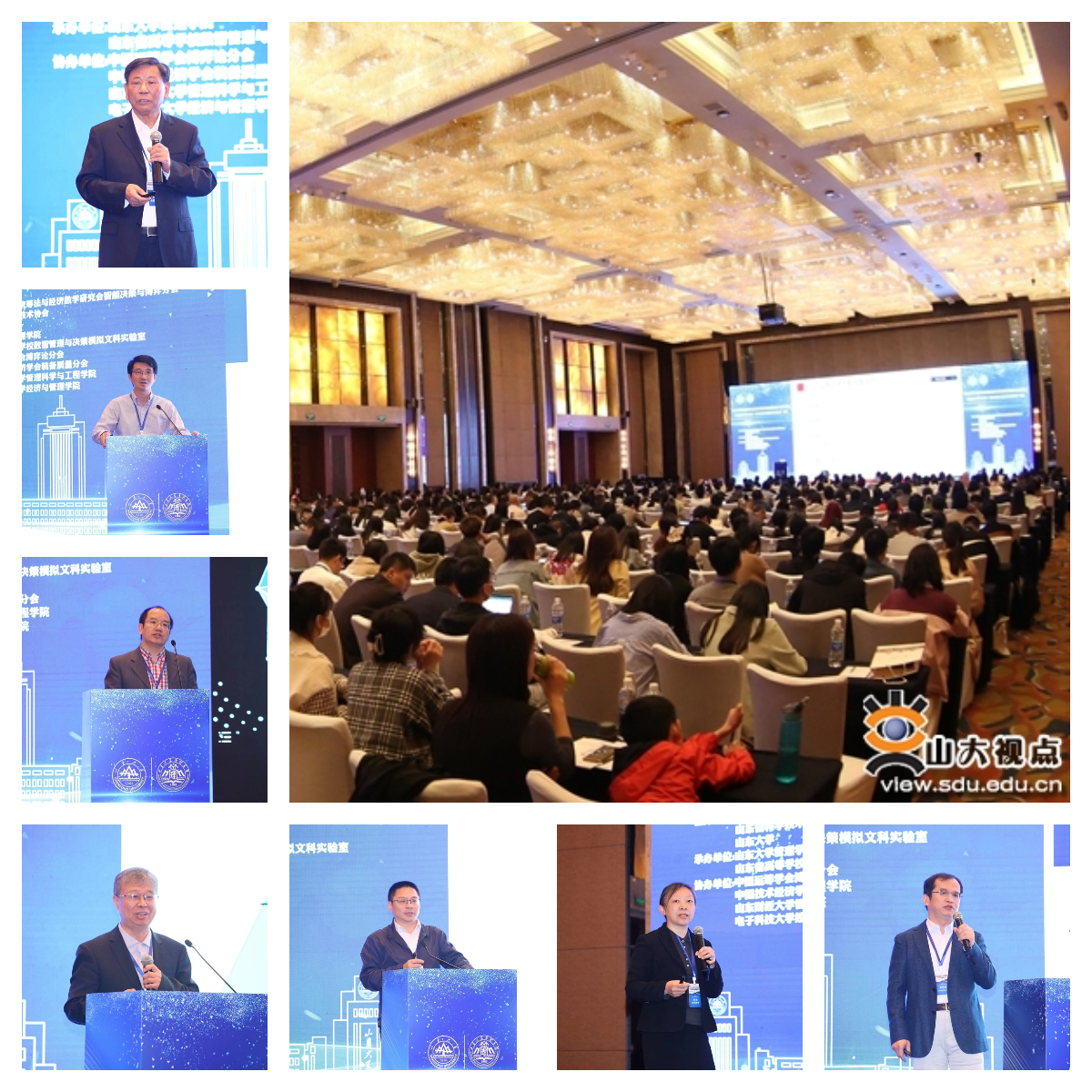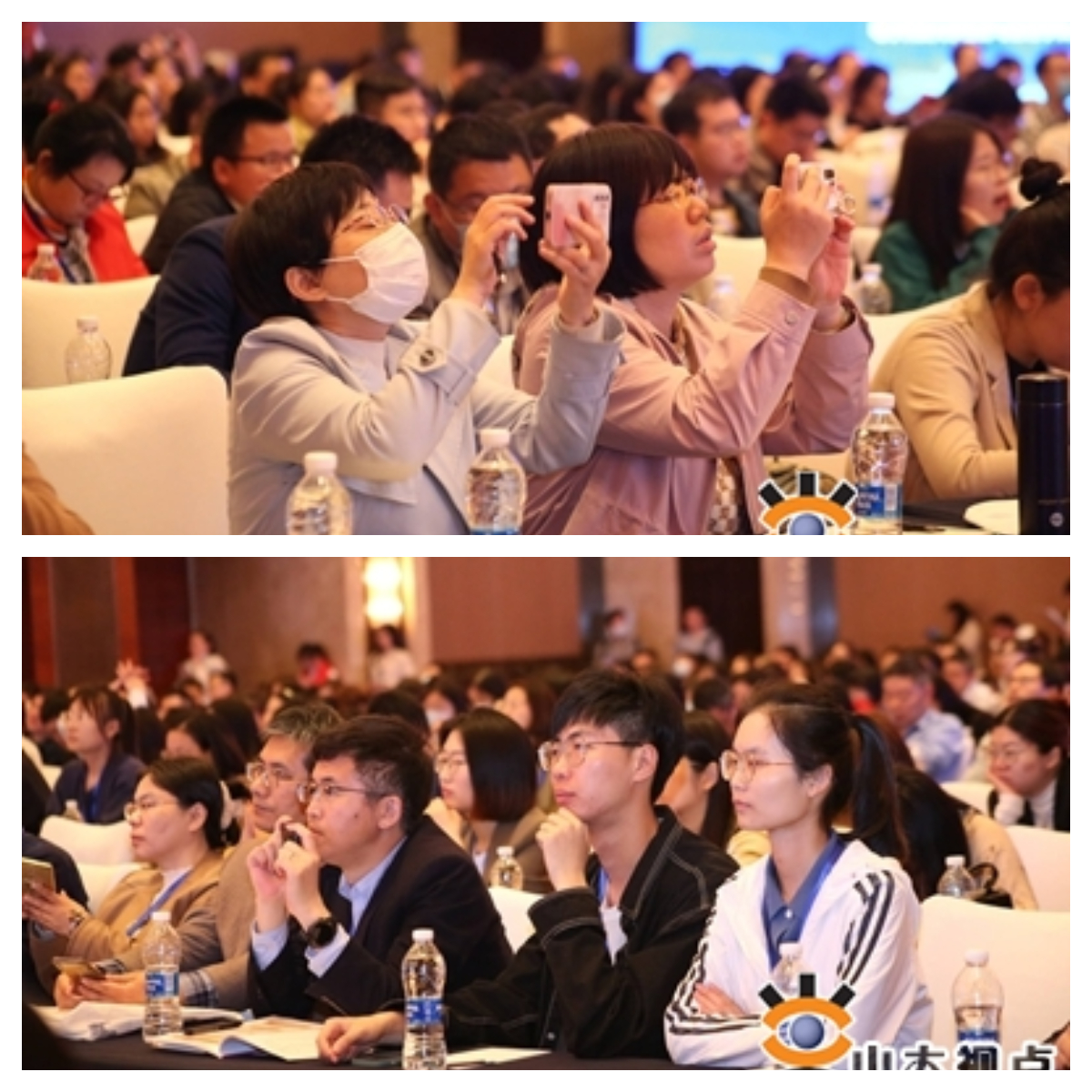From May 5 to May 7, the Annual Academic Meeting of Intelligent Decision-Making and Game Branch of Chinese Society of Optimization, Overall Planning and Economic Mathematics was held in Jinan with the theme of “Digital Economy and Digital Intelligent Management Decision-Making”. The conference focused on the achievements and progress in the field of intelligent decision-making and game in the digital economy era. More than 600 representatives from over 100 universities, research institutes, enterprises and institutions across the country attended the meeting and exchanged views, summed up management decision-making experience, and discussed various opportunities, challenges and development directions faced by the digital economy era.

Ling Wen, academician of Chinese Academy of Engineering and chairman of Shandong Association for Science and Technology, Yi Fan, vice president of Shandong University, Liu Zuoyi, deputy director of Management Science Department of National Natural Science Foundation of China, and Li Dengfeng, chairman of Intelligent Decision-making and Game Branch of “Optimization and Overall Planning” attended the meeting. Chen Xiaohong, academician of Chinese Academy of Engineering and Yang Shanlin, academician of Chinese Academy of Engineering attended the meeting and made reports.
At the opening ceremony, Yi Fan said that the forum on “Digital Economy and Digital Intelligence Management Decision-Making” has important theoretical and practical significance for promoting the development of digital economy and digital intelligence management decision-making, advancing practical innovation and management upgrading. He hoped that all experts and scholars would continue to care about and support the discipline construction and the development of Shandong University. Ling Wen introduced the development and achievements of digital economy in Shandong Province in recent years, and emphasized that we should seize the opportunities given by industrial digitalization and digital industrialization, promote the integration of discipline development and production and research, and realize high-speed economic development. Liu Zuoyi hoped that experts and scholars would have in-depth exchanges and discussions, took root in the main battlefield of China’s digital economy, and create a future of “Digital Economy and Digital Intelligence Management Decision-Making”. Gong Zaiwu, vice chairman of the “Optimization and Overall Planning” Intelligent Decision-Making and Game Branch, introduced the mission and responsibility of the “Optimization and Overall Planning” Intelligent Decision-Making and Game Branch. The opening ceremony of the meeting was presided over by Meng Qingchun, Party Secretary of School of Management of Shandong University.
In the report session of the meeting, Academician Chen Xiaohong gave a keynote speech on “Digital Intelligence Empowering Public Management Decision-Making Innovation and Application Practice”, systematically introduced the cutting-edge trend of digital intelligence technology in the digital economy era, and expounded the cutting-edge trend of a new generation of information technology, such as digital twin empowering industrial transformation and meta-universe leading digital industrialization, which triggered profound changes in economic development mode. Focusing on the innovation of high-energy platform to empower public management digital intelligence integration platform, she introduced the representative achievements and application demonstrations of the research team in three typical fields: public management big data governance, public health and emergency management, and resources, energy and environment.
Academician Yang Shanlin gave a keynote speech on “AIGC And Its Science And Technology Foundation”. He said that since the advent of deep learning, the development of artificial intelligence has moved towards large-scale applications. Especially in 2022, a series of application-level artificial intelligence content generation (AIGC) algorithms such as text generation, image generation and three-dimensional model generation came out, and gradually broke through the “thresholds” such as logical reasoning and common sense cognition, and moved towards general artificial intelligence. The research should focus on the theoretical and technical basis of artificial intelligence technology, emphasizing the irreplaceable role of cognitive science and brain science in the development of artificial intelligence.
Hong Liu, the professor of Fudan University, gave a keynote speech on “Research on Simulation Methods in Complex System Management: Challenges and Opportunities”, pointing out that with the development of social productive forces, many systems show complexity and uncertainty, and computer simulation is an important tool for modeling such complex systems, which can be used to solve many problems in complex system management. He pointed out that many emerging technologies, including high-performance computing, big data and artificial intelligence technologies, have greatly eased the complexity and uncertainty of the system, and the deep integration of these technologies and simulation tools will be the key to the development of the next generation of simulation tools.
Yu Lean, the professor of Sichuan University, gave a keynote speech on “Research on Optimization of Multi-Energy Complementary Collaborative Scheduling Based on Uncertainty of Source and Load Forecasting”, and proposed to design an optimization scheme of multi-energy complementary collaborative scheduling decision based on quantitative analysis of the uncertainty characteristics of source and load forecasting to solve the rolling scheduling problem in the day under the uncertainty of source and load. In addition, based on the uncertainty analysis results of source-load forecasting, he proposed an optimization scheme of multi-energy complementary cooperative scheduling for energy and power systems.
Yang Xiaoguang, the professor of Chinese Academy of Sciences, gave a keynote speech on “ ‘Hidden’ Mechanism of Customer Construction in Digital Economy”, pointing out that a core element in the digital economy era is customer construction. He used two mathematical models to reveal the logical mechanism behind two common customer building models, trying to explain the “hidden” mechanism behind them, and finally summed up the “systematic engineering” of customer building in digital economy.
Yu Yugang, the professor of University of Science and Technology of China, gave a keynote speech on “Data-Driven Intelligent Decision-Making of Robot Logistics”. He pointed out that with the development of e-commerce and automation technology, robots and their data-driven logistics decisions have been born. By solving the problem of unbalanced distribution and matching of different addresses and grids in robot sorting system, an approximate optimal algorithm of address-grid matching is proposed, which can obviously improve sorting efficiency. Beside, in view of the changing turnover rate of e-commerce FMCG products, he proposed the optimal strategy of dynamic goods classification and warehousing based on the implementation of big data.
Huang Min, the professor of Northeastern University, gave a keynote speech on “Decision-Making of Digital, Intelligence, and Logistics Supply Chains Operation and Management”, pointing out that the construction of digital, intelligence, and logistics supply chains is the product of the combination of three important national strategies: digital economy, artificial intelligence and modern supply chain construction, which has important strategic and practical significance. She introduced the decision-making framework of digital, intelligence, and logistics supply chains operation management; Focusing on different problems, this paper introduces the decision-making optimization model and algorithm in typical scenarios, with a view to providing guarantee for the effective operation of smart logistics supply chain.
Li Yongjian, the professor of Nankai University, gave a keynote speech on “Supply Chain: From Chain Management to Platformization”, and pointed out that the emergence of digital technology and platform has accelerated the development of manufacturing industry to “manufacturing ecological network”. Besides, we should take digital technology innovation and integration as the driving force and efficiency improvement, and take digital platform as the enabling carrier, and jointly explain how to integrate digital technology into the digitalization and intellectualization process of manufacturing enterprises from the two dimensions of “digital technology integration → digital platform ecological construction” and “B2B relationship →B2C relationship →B2B2C relationship”.
At the closing ceremony, Professor Li Dengfeng and Wu Changqi, Dean of the School of Management of Shandong University, respectively made a summary of the meeting. On the afternoon of May 6, the meeting started in the form of group report. There are 6 sessions, including 7 academic seminars, 7 periodical editors’ exchanges at home and abroad, 12 specially invited expert reports, and 90 group presentations of high-quality papers.

The annual academic meeting is sponsored by Intelligent Decision-Making and Game Branch of Chinese Society of Optimization, Overall Planning and Economic Mathematics, Shandong Association for Science and Technology and Shandong University, undertaken by the School of Management of Shandong University and Shandong University’s Mathematical Intelligence Management and Decision-Making Simulation Liberal Arts Laboratory, and co-organized by Game Theory Branch of Operations Research Society of China, Equipment Quality Branch of Chinese Society of Technology Economics, the School of Management Science and Engineering of Shandong University of Finance and Economics and the School of Economics and Management of University of Electronic Science and Technology of China. The meeting is an important platform for academic exchange and knowledge dissemination in the field of intelligent decision-making and game. The participants made full use of this exchange opportunity to deeply discuss the important basic theories and methods of intelligent decision-making and game, as well as the applied research of digital economy, sharing economy, smart logistics, smart business and smart medical care, showing the direction for the next research of intelligent management decision-making methods and also providing important intellectual and methodological support for serving the country’s major strategic needs and regional economic and social development.